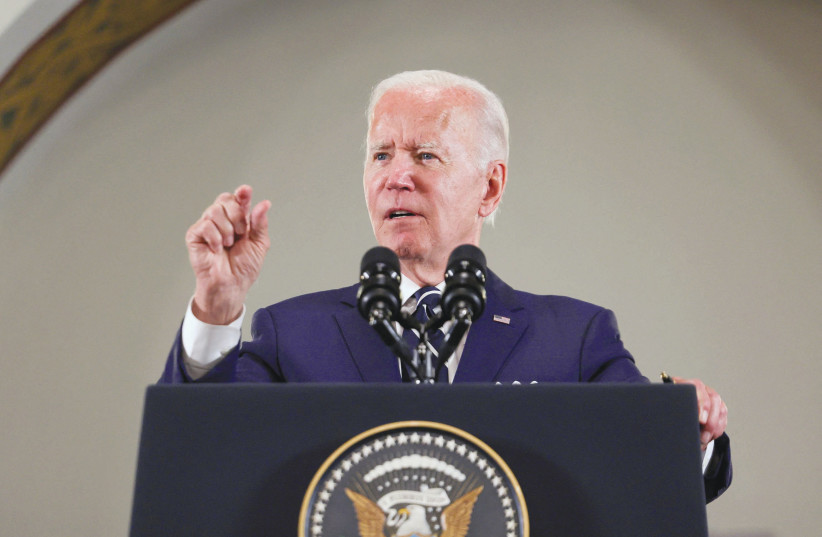President Joe Biden’s visit to Israel made it clear: like most Americans, Biden is a genuine friend of the Jewish state. He likes Israel for what it is – even if he might disagree with some things Israel occasionally does.
Unfortunately, that simple assertion of friendship – based on affinity, not uniformity of opinion – pits the president against a still-small, shrill, but ever-growing group of fellow Democrats.
When Channel 12’s Yonit Levi asked about the “voices in the Democratic Party” calling Israel “an apartheid state,” who essentially hate Israel for what it is, not what it does, he admitted “there are a few of them.” But, he proclaimed: “I think they’re wrong. I think they’re making a mistake. Israel is a democracy. Israel is our ally. Israel is a friend.”
More formally, upon arriving at Ben-Gurion Airport, Biden declared: “You need not be a Jew to be a Zionist.” This non-Jewish Zionist characterized “the connection between the Israeli people and the American people” as “bone deep.”
Biden identified three-dimensions of this connection. First, he said, “We invest in each other.” Despite being the hundredth most populous country, Israel is America’s 23rd-largest trading partner, bonded through $34 billion dollars in trade back and forth.

Then, Biden added, “We dream together.” While belonging to that exclusive country club of democracies, Israel and America belong to an even smaller subset of “dreamocracies,” countries founded around defining ideas, not just shared space. Unlike Europeans, Americans understand their nation as more than a common continental land mass. America is forged by a shared commitment to “life, liberty, and the pursuit of happiness.”
Similarly, Israel is more than a smaller, more contested, home – Israelis share a desire “to be a free people in our ancient homeland.” Although particular to each nation, these dreams overlap, in a universal vision hoping that every person – and every people – can find their democratic launching pad to safety, freedom and an ever-expanding quality of life as a gateway to meaningful lives.
Finally, Biden’s most intriguing phrase was also his most awkward one. He said: “We’re part of what has always been the objective we both have.” Emphasizing these dreamocracies’ “shared values” and “shared vision,” Biden recognized that both societies are dynamic, perpetually stretching. Freedom-building is a full-time job. Liberty-loving countries never rest.
“The ancient roots of the Jewish people [in Israel] date back to biblical times.”
President Joe Biden
They must forever be expanding the circle of freedom: magnifying rights, improving their nation, bettering the world. Being “part” of each other’s “objective” acknowledges our win-win – a strong America strengthens Israel, and a strong Israel boosts America. Both countries are on the right side of history, backing each other up in opposing totalitarianism – at home and abroad.
That’s why I add the phrase “shared challenges.” It recognizes the stresses facing democracies today, while inviting a more humble dialogue. Nations should brainstorm about solving common problems, rather than just celebrating mutually reinforcing ties.
Not perfect, but not bad at all
Admittedly, I would have preferred to see unanimity between Israel and Biden. I toast Biden’s growing awareness regarding the dangers of Iran’s sick quest for nukes and its evil Revolutionary Guards, yet I cringed when Biden’s staff removed Israel’s flag from his limousine before entering east Jerusalem. (As a presidential historian, I deem this an unnecessary error: the limousine should fly only two flags everywhere – America’s and the president’s seal.)
Nevertheless, these minor frictions reinforced the broader message of a friendship resilient enough to absorb policy differences.
HERE IS where Biden’s age is a factor – for the good. Born in 1942 to pious, patriotic Catholics, Biden grew up understanding that, as he said, “the ancient roots of the Jewish people [in Israel] date back to biblical times,” and the once homeless Jews deserve a national home. Biden’s sympathy for Zionism contrasts with the Israel-bashers, both Jewish and non-Jewish, who echo today’s trendy vocabulary of delegitimization, sloppily and cruelly applying a critique of Western imperialism to Jews’ unique story.
Biden’s pro-Zionism contrasts with woke extremists like the Democratic member of Congress, Cori Bush, who on Saturday attended a fundraiser organized by Neveen Ayesh. The government relations coordinator for the St. Louis chapter of American Muslims for Palestine, Ayesh has tweeted out filth saying “I tried befriending a Jew once. Worst idea ever” and “I want to set Israel on fire with my own hands & watch it burn to ashes along with every Israeli in it.”
But Biden’s mature example also resists the silliness of Peace Now, which hung a huge poster in Tel Aviv proclaiming – in Hebrew – “welcome to the two states we love the most.” As the election campaign intensifies, and people wonder why Israel’s Left lacks credibility, remember that sign.
Beyond the obvious facts that Biden doesn’t speak Hebrew and the “state” of Palestine doesn’t exist, the entities currently representing Palestinians are corrupt, terrorist-addicted, dictatorships, fueled on anti-Jew hatred, abusing their own people in the West Bank and Gaza, and particularly hostile to Zionists – as well as fellow Palestinians advancing American liberal-democratic ideals. Ignoring those realities, falsely equating your own democratic country with its authoritarian enemies, confuses peacemaking with breast-beating.
Pit stop
Admittedly, a cynical British friend of mine was correct. Biden’s Israel visit was a most elaborate rest stop on the way to the Saudi Arabian “petrol station.” Still, Biden done good. He showed Democrats at home – and peaceniks in Israel – how to recognize the eternal ideals that make Israel Israel and link Americans and Israelis in our unique and mutually beneficial bond. For that, we should say, “Toda raba! Thank you, Mr. President.”
The writer is a distinguished scholar of North American history at McGill University, and the author of nine books on American history and three on Zionism. His book Never Alone: Prison, Politics and My People, coauthored with Natan Sharansky, was published by PublicAffairs of Hachette.
